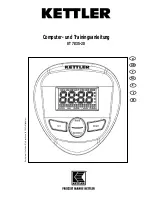
Using, Creating and Editing Songs
Using the Practice Function (Guide)
CGP-1000 Owner’s Manual
142
For Keyboard Performance
Follow lights
With this function, the keyboard guide lamps indicate which notes you should play
(page 39). Song playback pauses and waits for you to play. When you play the cor-
rect notes, Song playback continues.
Any key
With this function, you can play the melody of a Song just by pressing a single key
(any key is OK) in time with the rhythm. Song playback pauses and waits for you to
play any key. Simply play a key on the keyboard in time with music (any key is OK)
and the Song playback continues.
For Karaoke
Karao-key
This function lets you control the Song playback timing with just one finger, while
you sing along. Song playback pauses, waiting for you to sing. Simply play a key
on the keyboard (any key is OK) and the Song playback continues. (For this func-
tion, the notes of the keyboard do not sound.)
Vocal CueTIME
This function lets you practice singing with the proper pitch.
Song playback pauses, waiting for you to sing. When you sing with proper pitch,
Song playback continues.
Determining the timing by which the keyboard guide lamps
light (GUIDE LAMP TIMING)
Press the [D] button in the SONG SETTING display in step 1 (page 141) to
select the timing by which the keyboard guide lamps light.
JUST
........................... The guide lamps light in time with the music, at the
same timing you should play.
NEXT
......................... The guide lamps light slightly ahead of the music,
indicating the notes you should play next. The
guide lamps flash if you fail to play the keys with
the correct timing.
If the guide lamps do not light as intended
The guide lamps light according to Song channels recorded to Track 1 and
2 and the chord data in the Song (when such data is included).
If the guide lamps do not light as intended, you may need to assign the
appropriate right- and left-hand channels to Track 1 and 2 respectively, by
using the [1
π†
]/[2
π†
] buttons in the SONG SETTING display as
described in step 1 on the previous page.
















































